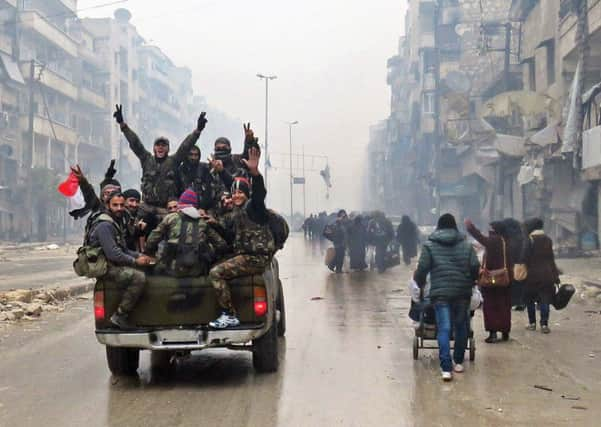Leader comment: Aleppo victory means Assad and Russia have won


This very modern take, comes in the midst of reports of harrowing atrocities against ordinary people caught up in the conflict, including a building housing up to 100 unaccompanied children coming under attack, and the killing of 82 civilians, including women and children.
The UN says it has reliable evidence, but that not all reports can be verified.
Advertisement
Hide AdAdvertisement
Hide AdHowever, the news coming out of Aleppo in the last desperate final moments certainly plays to long-held fears. Russians and Syrians have been accused of atrocities in the past, and there have been claims of both sides in Aleppo using chemical weapons, such as chlorine, in breach of international law.
MPs held an emergency debate in the House of Commons comparing the atrocities to genocides in Rwanda and Srebrenica. Over 2,000 miles away among the terror and constant bombardment, the uncomfortable truth is that the intervention of the Russian forces has proved to be decisive.
Now Aleppo is taken, it will be Syrian government forces and the Russians who will be in a position to put measures in place to stop old scores being settled and to take a lead role in rebuilding a battered city and populace.
What the West has to do now is to accept that Russia has very publicly stolen a march and work out a long-term strategy for getting back to a tenable position in the region.
Prime Minister Theresa May’s spokeswoman has said the international community has to unite in a “political transition” away from Syria’s Bashar Assad. But he is certainly going to be the victor.
Russia’s ambitions and the pursuit of its strategic goals have seen it engage recent times in conflict in Georgia in 2008, the Crimea in 2014 and southeastern Ukraine in 2014-15 before making its first intervention in the Levant since 1772.
President Vladimir Putin, a keen student of Russian military history, is unlikely to have entered into such a partnership with Assad without considering the political and geopolitical endgame. As the alliance was formed he may well have factored in the generally held view that President Obama had no stomach for military intervention.
It may be that all we can do is hope Russia is more interested in peace and security, as seen by their cooperative attitude in the Arctic, than furthering its own interests. Putin’s relationship with president-elect Donald Trump will also be a key factor in developing a strategy to defeat IS, and to reaffirm or otherwise, Nato’s standing.
Advertisement
Hide AdAdvertisement
Hide AdBut so far the evidence points to Russia looking out for its own interests and carving out a widening sphere of influence. Peace, of sorts, may come to Aleppo, but the international power play currently underway does not bode well for the wider world.